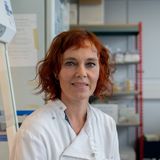Get to know the Keynote Speakers

Josep Dalmau
University of Barcelona, ES
Dr. Josep Dalmau received his MD and PhD from the Autonoma University of Barcelona, and trained in Neuro-oncology at Memorial Sloan-Kettering Cancer Center, New York, after which he joined the faculty.
In 2002 he moved to the University of Pennsylvania (UPenn) where he was Professor of Neurology.
He is currently Professor at the Catalan Institute for Research and Advanced Studies (ICREA)-IDIBAPS, University of Barcelona, and Adjunct Professor of Neurology at UPenn.
Dr. Dalmau’s research is focused on a new category of immune-mediated diseases against synaptic receptors that result in prominent neurologic and psychiatric syndromes.
Dr. Dalmau is the recipient of numerous awards; he is a member of the National Academy of Medicine and many other scientific societies and serves as Editor of Neurology: Neuroimmunology and Neuroinflammation.

Barbara Casadei
University of Oxford, UK
Barbara Casadei is a British Heart Foundation (BHF) Professor of Cardiovascular Medicine at the University of Oxford and Honorary Consultant Cardiologist at the Oxford University Hospitals NHS Trust where she leads the Cardiovascular Theme of the National Institute for Health Research (NIHR) Biomedical Research Centre and is Steering Committee Member of the Oxford BHF Centre for Research Excellence.
Professor Casadei graduated in Medicine at University of Pavia, Italy (cum Laude & Medaglia Teresiana), moved to Oxford in 1989 to undertake her clinical and research training and was awarded a DPhil in Cardiovascular Medicine (Pembroke College) in 1995. She is a Fellow of the UK Academy of Medical Sciences and the Immediate Past President (2020-22) of the European Society of Cardiology.
Professor Casadei provides a clinical service at Oxford University Hospitals NHS Trust's John Radcliffe Hospital and leads a bench-to-bedside translational research programme, which spans from bench-based investigation in human tissue and cells to clinical trials with a focus on atrial fibrillation.

David Sampson
University of Surrey, UK
Professor David Sampson is the Pro-Vice-Chancellor of Research & Innovation at the University of Surrey.
His research interests are in the application of light in medicine and biology and he is an authority on optical coherence tomography (OCT). His current interests are in optical microscopy, guided-wave micro-optics and parametric extensions of OCT, such asmicroscope-in-a-needle, endomicroscopy, optical elastography, polarization-sensitive OCT and OCT angiography.
Professor Sampson is a fellow of the optical societies, SPIE and OSA, of the American Institute for Medical and Biological Engineering and also of the electrical engineering society, IEEE. He also serves in various society committees and editorial boards. He is currently an advisor to the board of directors of the SPIE.
His nearly 30 years of research experience include a professorship at the University of Western Australia, a senior lecturer position and senior research fellowship at the University of Melbourne and a tenured Lecturer position and research fellowship at the University of Kent at Canterbury.
Sampson’s body of work also includes a multitude of activities in the industry including commercialisation of his research through spin-off companies and support for analytical and imaging core facilities on the national and international level.

Jessica Strid
Imperial College London, UK
Dr Jessica Strid is a Reader in Cellular Immunology at the Department of immunology and inflammation, Imperial College London, UK.
Dr Strid did her MSc degree at the Danish University of Pharmaceutical Sciences in Copenhagen. She did her PhD in immunology at the Institute of Child Health, University College London, UK with a focus on food allergy and skin immunology. As a PostDoc she joined Adrian Hayday’s research group at Kings College Londonand later worked at Cancer Research UK. Her PostDoc studies were focused on autologous sterile stress responses in the skin and their recognition by resident immune cells. In 2012 Dr Strid became and independent group leader and joined Imperial College London as a Non-clinical Lecturer. The following year she was awarded the Wellcome Trust New Investigator Award and subsequently in 2019 the prestigious Wellcome Trust Investigator Award. The Strid laboratory studies immune surveillance at epithelial body surface tissues, such as the skin, with a focus on understanding the role of tissue resident and infiltrating immune cells in regulating epithelial cell homeostasis, repair and carcinogenesis. The laboratory has a particular interest in the origins of Type 2 immunity and its role in immune stress-surveillance.
The current lecture will discuss the capacity of tissue resident lymphoid cells to directly sense epithelial cell stress and initiate a restorative response. It will explore the type 2 nature of this response and particularly its links to type 2 B cell biology and induction of IgE antibodies. A role for IgE as a host defense mechanism against environmental DNA-damaging xenobiotics anda cooperative role for T and B cell immune surveillance in epithelial tissues will be proposed.

Leila Akkari
The Netherlands Cancer Institute, NL
Leila Akkari is a junior group leader at the Netherlands Cancer Institute, Amsterdam.
She gained a PhD at the Institute of Molecular Genetics of Montpellier, CNRS (French National Research Center) in the lab of Dr. Urszula Hibner. Afterward, she became a Postdoctoral Research Fellow at the Memorial Sloan Kettering Cancer Center, New York City (USA) and Ludwig Cancer Center, Lausanne (CH), working in the lab of Prof. Johanna A. Joyce. Since 2017, Leila Akkari is an Assistant Professor at the Department of Tumor Biology and Immunology at the Netherlands Cancer Institute in Amsterdam (NL). In 2019, she received the Research Grant KWF (Dutch Cancer Society) and in 2020 the Vidi Research Grant NWO (Life Sciences Netherlands). Among numerous grants and awards she received, she was selected as Junior Member of the Oncode Institute (NL) in 2019 and recently got selected for the EMBO Young Investigator Program.
Her research group is interested in the microenvironment-mediated mechanisms of tumor development and therapeutic resistance to conventional therapy in brain and liver malignancies. Cancer is a system where cooperation is the prevailing feature, and more knowledge is needed to uncover not only the intrinsic mechanisms of tumor cell transformation, but also the supporting role of tumors local and systemic environments. Her laboratory focuses on the role of macrophage and myeloid cell populations in solid tumors, to identify vulnerabilities in cancer cell/ stroma heterotypic communication that can be targeted therapeutically.